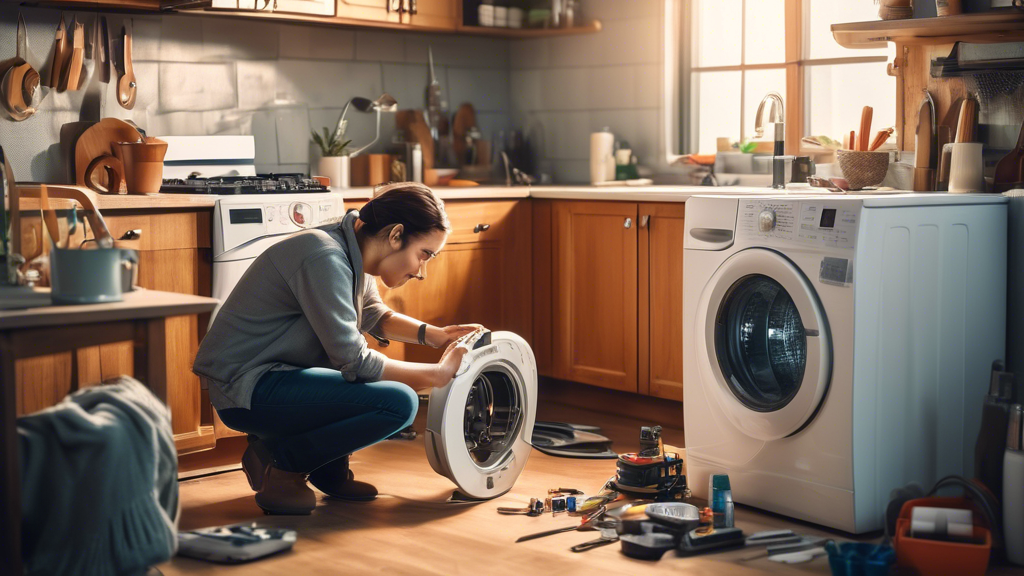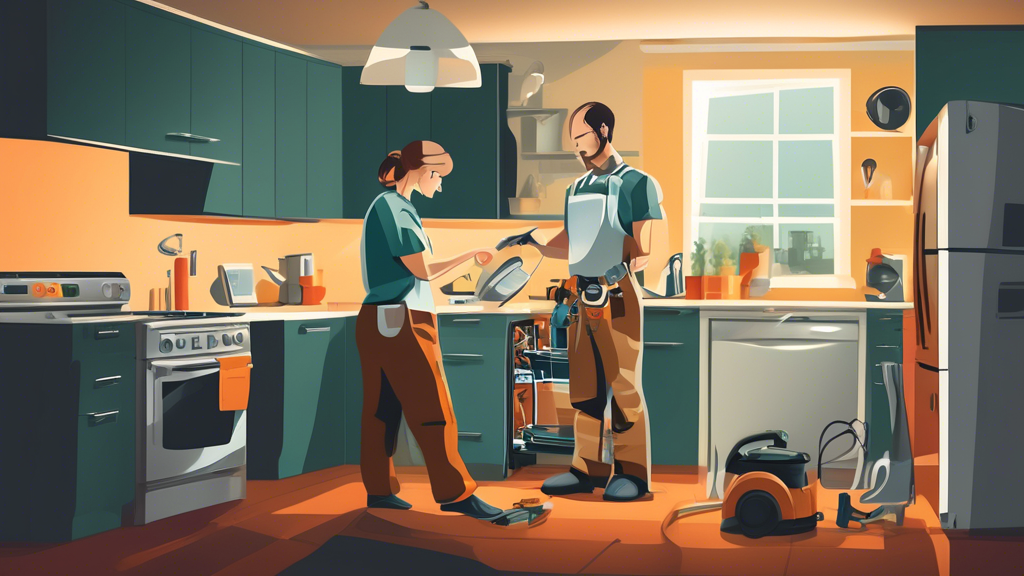Appliance repair is an essential skill that every homeowner should have in their toolkit. With modern life heavily reliant on a range of household appliances—like refrigerators, dishwashers, and washing machines—understanding how to maintain and troubleshoot these devices can save you time, money, and hassle. Routine maintenance and quick fixes can prolong the lifespan of your appliances while helping you avoid costly repair bills or replacements. However, homeowners often encounter common issues, such as strange noises from the refrigerator or a washing machine that won’t spin, which can create frustration and uncertainty about the next steps. This comprehensive guide to appliance repair will empower you with valuable tips and tricks to tackle these challenges confidently. Whether you’re interested in DIY solutions or know when to call in professional help, our guide provides a broad overview of appliance repair services, essential DIY troubleshooting techniques, a list of necessary tools, and critical safety precautions. By understanding the fundamentals of appliance maintenance and repair, you can ensure your home runs smoothly while maximizing the efficiency and longevity of your appliances.
Introduction to Appliance Repair
Importance of Appliance Maintenance
Regular maintenance is crucial for the longevity and efficiency of your home appliances. Appliance repair is not just about fixing broken machines; it’s about preventing those breakdowns in the first place. Well-maintained appliances operate more efficiently, helping you save on energy bills while reducing the risk of expensive repairs. Moreover, routine maintenance can enhance the safety of your appliances, preventing hazards like fires or harmful leaks. Investing time in understanding and performing basic maintenance can prolong the life of your appliances, making them a worthwhile investment for any homeowner.
Common Issues Homeowners Face with Appliances
Homeowners frequently encounter issues with various appliances, and understanding these common problems can empower you to handle them effectively. Here are some frequent appliance issues:
– **Refrigerators**: One of the most common issues is inadequate cooling. This can stem from dirty coils, malfunctioning thermostats, or an improperly closed door. Additionally, ice buildup can lead to further complications, including water leaks.
– **Washing Machines**: Homeowners often face issues such as leaks, unbalanced loads, or machines failing to spin. Clogged hoses and filters can also lead to performance problems, resulting in dissatisfied laundry outcomes.
– **Ovens**: Common problems with ovens include uneven heating, a broken oven light, or issues with the self-cleaning feature. Gas ovens may face igniter malfunctions, while electric ovens can experience temperature inconsistencies.
By being aware of these issues, you can take preemptive actions to maintain your appliances and identify minor problems before they escalate into costly repairs.
Overview of Appliance Repair Services
When DIY fixes aren’t feasible or effective, knowing when to rely on professional appliance repair services is key. These services encompass a wide range of offerings, including diagnostics, repairs, and upgrades for virtually all types of household appliances.
Professional technicians are equipped with the specialized knowledge and tools necessary to address complicated issues safely. Whether dealing with electrical problems in your refrigerator or mechanical failures in your washing machine, professional services can provide quick and efficient solutions.
When choosing an appliance repair service, look for companies that offer warranties on their work, as this can provide peace of mind that the job will be done correctly the first time. Furthermore, selecting a service with good customer reviews can greatly enhance your experience.
In summary, understanding the importance of appliance maintenance, recognizing common appliance issues, and knowing when to call in experts can save homeowners time and money over the lifespan of their appliances. This foundational knowledge is essential for anyone looking to effectively manage their home appliances and optimize their performance.

DIY Tips and Tricks for Common Appliance Problems
Step-by-Step Troubleshooting for Major Appliances
Identifying and solving common issues with major appliances can often be achieved through DIY troubleshooting. Here, we cover step-by-step guides for the most frequently encountered problems with refrigerators, washers, and ovens.
Refrigerators
One of the most common issues with refrigerators is inadequate cooling. If you notice that your fridge isn’t keeping food cold, try these troubleshooting steps:
1. **Check the Temperature Settings**: Ensure the thermostat is set to the appropriate setting, usually between 37°F to 40°F for the fridge and 0°F for the freezer.
2. **Inspect Door Seals**: Examine the rubber seals around the doors for any signs of wear or damage. A worn-out seal can allow cold air to escape, making your refrigerator work harder.
3. **Clean the Condenser Coils**: Dust buildup on the coils can lead to inefficiency. Locate the coils, usually at the back or beneath the appliance, and gently clean them with a vacuum or brush.
4. **Check the Evaporator Fan**: If the fan isn’t running, the refrigerator may not cool effectively. Listen for any unusual noises, and clean or replace the fan if necessary.
5. **Defrost**: If your refrigerator has a lot of frost build-up, it might be time to defrost it according to the manufacturer’s instructions.
Washing Machines
Washing machines may refuse to spin or drain properly. Follow these steps to troubleshoot:
1. **Check the Power Supply**: Ensure that the machine is plugged in and the outlet is functioning. You can test this by plugging in another appliance.
2. **Inspect the Door Latch**: For safety reasons, many washing machines will not operate if the door is not securely closed. Make sure the door latch is engaging properly.
3. **Examine the Drain Hose**: A clogged drain hose can prevent the machine from draining. Check for kinks or clogs and clear any blockages.
4. **Level the Machine**: An unbalanced washer might not spin correctly. Adjust the leveling feet until the machine sits flat on the floor.
5. **Run a Diagnostic Test**: Many modern washers come with a built-in self-diagnostic feature. Refer to the owner’s manual for instructions on accessing this feature.
Ovens
Ovens that fail to heat properly can be very frustrating. Here’s how to troubleshoot:
1. **Check the Power Supply**: Like with washing machines, ensure the oven is plugged in and that the circuit breaker hasn’t tripped.
2. **Verify Temperature Settings**: Confirm that the oven is set to the desired temperature. Sometimes, it’s as simple as mistakenly setting it to ‘keep warm’ instead of ‘bake.’
3. **Inspect the Heating Elements**: Look for signs of wear or damage on the heating elements (especially for electric ovens). If an element appears broken, it may need to be replaced.
4. **Calibrate the Oven**: If your oven is consistently off in temperature, it might need calibration. Follow the manufacturer’s guide for steps on how to recalibrate.
5. **Look at the Igniter**: For gas ovens, the igniter may need replacement if it glows but doesn’t ignite the gas.
Essential Tools and Supplies Needed for DIY Repairs
Having the right tools on hand can make appliance repair much easier. Here’s a list of essential tools every homeowner should consider for basic appliance maintenance and repairs:
1. **Screwdriver Set**: A variety of flat and Phillips screwdrivers will help you open many appliances.
2. **Multimeter**: This tool is vital for testing electrical connections, ensuring that power is properly supplied to the appliance.
3. **Pliers**: A good quality pair of pliers is essential for gripping and bending wire.
4. **Wrenches**: Both adjustable and socket wrenches will assist in loosening or tightening mechanical components.
5. **Utility Knife**: A sharp utility knife can help in making clean cuts for various materials.
6. **Vacuum Cleaner**: Essential for cleaning dust and debris, especially from condenser coils and vents.
7. **Replacement Parts**: Keeping a few common replacement parts, like seals and filters, can save you time when a repair is necessary.
8. **Buckets and Towels**: Having these on standby can be crucial for managing spills, particularly with washers and refrigerators.
Safety Precautions to Take While Repairing Appliances
While tackling DIY appliance repair can save time and money, safety should always be your top priority. Here are some crucial safety precautions to keep in mind:
1. **Unplug the Appliance**: Before starting any repair work, always unplug the appliance to avoid electrical shock.
2. **Wear Safety Gear**: Consider using safety goggles and gloves to protect against sharp edges or debris.
3. **Work in a Well-Lit Area**: Adequate lighting can help you see the intricate parts of the appliance, reducing mistakes and accidents.
4. **Be Mindful of Sharp Objects**: Appliances often have sharp components, especially in kitchen tools. Use caution when handling these.
5. **Keep Children and Pets Away**: Ensure that children and pets are in a different room while you perform repairs to avoid distractions or accidents.
6. **Follow Manufacturer Guidelines**: Always refer to the owner’s manual for specific instructions and safety warnings related to your appliance.
By mastering these DIY tips and tricks, you can tackle common appliance problems head-on, potentially saving yourself the hassle and expense of professional repairs.

When to Call a Professional for Appliance Repair
Appliances are essential to the smooth functioning of any household. While many homeowners are eager to tackle minor repairs themselves, certain issues require the expertise of a professional. Understanding the signs that indicate a need for expert help can save you time, money, and further damage to your appliances.
Signs That Indicate a Need for Expert Help
Recognizing when to call in a professional for appliance repair is crucial. Here are some common signs that suggest it’s time to seek expert assistance:
- Unusual Noises: If your refrigerator, washing machine, or oven starts making strange sounds—such as grinding, humming, or banging—it’s a strong indication that something is wrong. These noises can signify issues with motors, belts, or other critical components that require professional inspection.
- Frequent Breakdowns: If you find yourself constantly repairing the same appliance, it may be more cost-effective to call a professional. Repeated breakdowns often indicate larger underlying issues that need expert diagnosis.
- Visible Damage: Inspect your appliances regularly. If you notice frayed wires, leaks, or physical damage, it is a strong signal that professional intervention is needed. Attempting to fix these issues yourself can pose safety risks or exacerbate the problem.
- Reduced Performance: Appliances that struggle to perform efficiently, such as a dryer taking longer to dry clothes or a refrigerator that doesn’t keep items cold, should be examined by a technician. This could indicate a failing motor, compressor, or other essential components.
- Unpleasant Odors: Any strange smells emanating from appliances, particularly refrigerators or microwaves, can indicate electrical issues or even the presence of mold. These situations require professional evaluation.
- Error Codes: Many modern appliances feature digital displays that provide error codes when malfunctions occur. If you encounter one of these codes and troubleshooting doesn’t help, it’s time to call in a professional who can interpret the problem accurately.
How to Choose a Reputable Appliance Repair Service
When seeking professional appliance repair services, selecting the right technician is essential for a satisfactory resolution. Here are some steps to ensure you choose a reputable service:
- Research Online: Start by searching for appliance repair services in your area. Check reviews on platforms like Google, Yelp, and Angie’s List. Pay attention to overall ratings and specific customer experiences, as they can provide insight into the company’s reliability and quality of work.
- Ask for Recommendations: Word of mouth can be invaluable. Ask friends, family, or neighbors for recommendations based on their experiences with appliance repair services. This can lead you to trustworthy technicians who have a good track record.
- Check Credentials: Ensure that any service you consider has the proper licensing and insurance. Reputable companies should be willing to provide proof of their credentials. This protects both you and the technician in case of any accidents or damages that occur during the repair process.
- Request Estimates: Before committing to a service, request written estimates from multiple providers. This not only helps you compare prices but also gives you an idea of the problem’s scope based on the technician’s diagnosis. A transparent estimate helps you avoid surprise charges later on.
- Inquire About Warranty: A trustworthy appliance repair service should offer warranties on their labor and the parts used. This protects you from additional costs if the same problem reoccurs shortly after repair.
- Assess Customer Service: Contact potential services to gauge their customer service quality. A prompt, friendly response to your inquiries is often a good indicator of the level of service you can expect during repairs.
Cost Considerations and Warranty Information for Appliance Repairs
Understanding the cost of appliance repair is crucial for homeowners. Repairs can vary widely based on factors such as appliance type, the nature of the issue, and labor costs in your area. Here are some key considerations regarding cost and warranties:
- Typical Costs: On average, appliance repair costs range from $100 to $400, depending on the appliance and repair complexity. For example, refrigerator repairs might be around $300, while fixing a washing machine could be less expensive. Higher-end appliances or more complicated issues may cost more.
- Service Call Fees: Many appliance repair companies charge a service fee to diagnose the problem, which may be applied toward the total repair cost if you hire them. Understanding this fee upfront can help avoid surprises.
- Parts vs. Labor Costs: Be aware that labor costs often make up a significant portion of the total repair price. When receiving estimates, ensure you understand what percentage of the cost is due to parts and what is attributed to labor.
- Warranty Information: If your appliance is still under warranty, it may cover certain repairs at no cost to you. Always check your warranty terms before seeking repairs, as many manufacturers have specific guidelines on how to proceed and which repairs are covered.
- Cost vs. Replacement: In situations where repair costs are near or exceed the cost of a new appliance, it may be more beneficial to invest in a replacement. A professional technician can help you make this decision by providing insight into the expected lifespan of the appliance post-repair.
Knowing when to call a professional, how to choose the right service, and understanding cost considerations can greatly enhance your appliance repair experience. By taking these steps, you’ll ensure that your appliances are in good hands and will function effectively for years to come.
In conclusion, understanding the fundamentals of appliance repair is an invaluable skill for homeowners seeking to maintain the longevity and efficiency of their household devices. By prioritizing regular maintenance, individuals can avoid common issues that may arise with appliances, ultimately saving time and money. The DIY tips and tricks outlined in this guide empower homeowners to tackle typical malfunctions—such as a refrigerator that won’t cool or a washing machine that doesn’t spin—equipping them with essential troubleshooting steps and a list of necessary tools. However, it is crucial to recognize when a situation exceeds the scope of DIY repairs and requires the expertise of a professional. Knowing the signs that indicate the need for expert assistance not only ensures safety but also guarantees that repairs are handled correctly and effectively.
When seeking professional help, selecting a reputable appliance repair service becomes paramount; this involves considering factors such as experience, customer reviews, and cost. Understanding warranty limitations and potential repair costs can also aid homeowners in making informed decisions regarding their appliance issues. By incorporating this knowledge into their maintenance routine, homeowners can enhance their understanding of appliance repair, promoting a more resilient and efficient home environment. Ultimately, whether opting for DIY repairs or calling in the professionals, a proactive approach to appliance care will lead to greater satisfaction and peace of mind in managing household needs.

